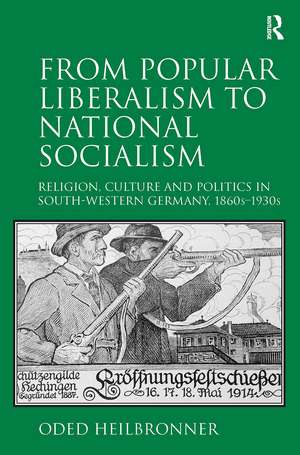From Popular Liberalism to National Socialism: Religion, Culture and Politics in South-Western Germany, 1860s-1930s
Autor Oded Heilbronneren Limba Engleză Paperback – 29 ian 2024
| Toate formatele și edițiile | Preț | Express |
|---|---|---|
| Paperback (1) | 391.57 lei 6-8 săpt. | |
| Taylor & Francis – 29 ian 2024 | 391.57 lei 6-8 săpt. | |
| Hardback (1) | 1002.63 lei 6-8 săpt. | |
| Taylor & Francis – 28 dec 2015 | 1002.63 lei 6-8 săpt. |
Preț: 391.57 lei
Nou
Puncte Express: 587
Preț estimativ în valută:
74.94€ • 76.74$ • 62.33£
74.94€ • 76.74$ • 62.33£
Carte tipărită la comandă
Livrare economică 18 martie-01 aprilie
Preluare comenzi: 021 569.72.76
Specificații
ISBN-13: 9781138307216
ISBN-10: 1138307211
Pagini: 270
Dimensiuni: 156 x 234 x 14 mm
Greutate: 0.5 kg
Ediția:1
Editura: Taylor & Francis
Colecția Routledge
Locul publicării:Oxford, United Kingdom
ISBN-10: 1138307211
Pagini: 270
Dimensiuni: 156 x 234 x 14 mm
Greutate: 0.5 kg
Ediția:1
Editura: Taylor & Francis
Colecția Routledge
Locul publicării:Oxford, United Kingdom
Cuprins
Part I Introduction: The argument; Definition of key concepts; Methodological considerations. Part II The Radical-Liberal Subculture in Greater Swabia: The local Catholic bourgeoisie: anti-clericalism and progress; The religion of the subculture: the old Catholics; The Verein’s culture in the service of Popular Liberalism, 1860-1930; The disintegration of the local Vereine. Part III The Politics of the Subculture, 1860s-1930s: The political culture of Greater Swabia: an overview; Main stages in the development of Popular Liberalism in South Germany. Part IV Conclusion: From Popular Liberalism to National Socialism: currents of continuity; Concluding remarks. Appendix; Bibliography; Index.
Notă biografică
Oded Heilbronner is a Professor in Cultural and Historical Studies at the Shenkar College of Engineering, Design and Art and lecturer at the Hebrew University of Jerusalem, Israel.
Descriere
This book investigates the development of what the author terms ’popular liberalism’, in order to present a more nuanced understanding of political and cultural patterns in Germany up to the early 1930s. In particular, the author offers an explanation for the success of National Socialism before 1933 in certain regions of South Germany, arguing that the radical liberal sub-culture was not subsumed by the Nazi Party, but instead changed its form of representation. By looking afresh at the relationship between local-regional identities and national politics, this book makes a major contribution to the study of the roots of Nazism.
